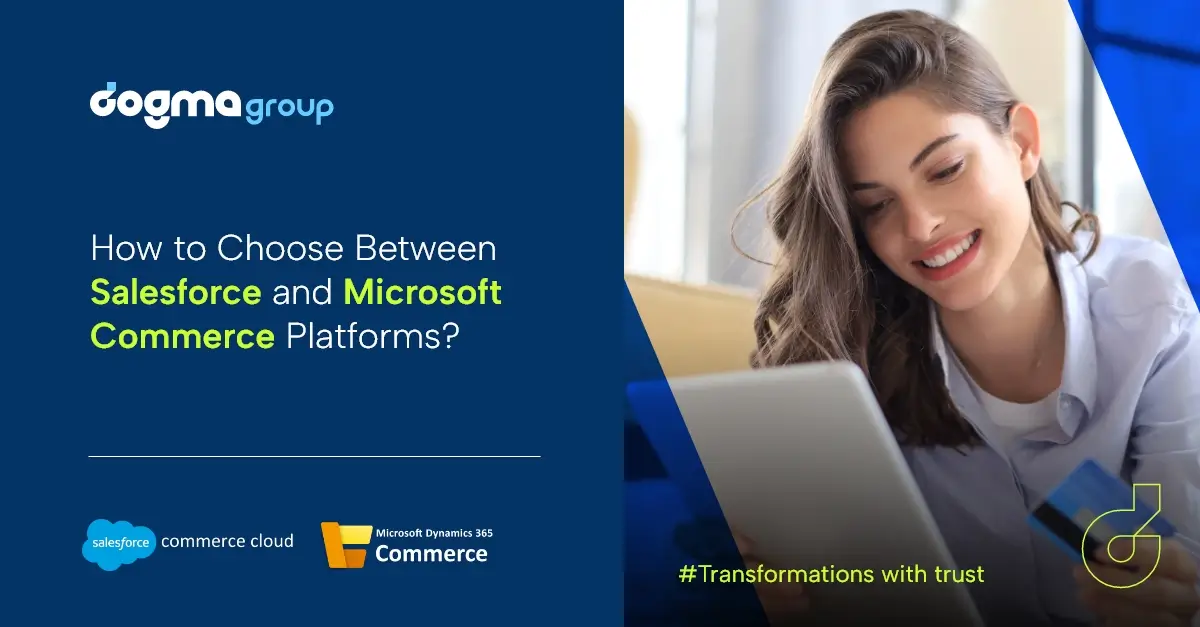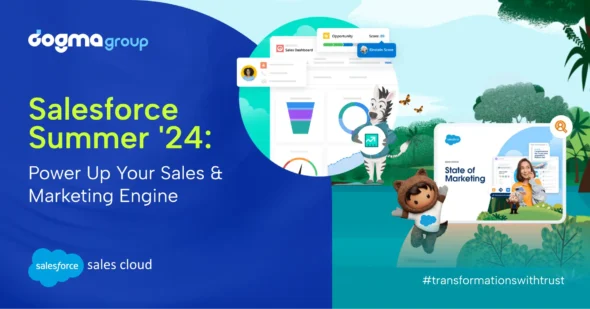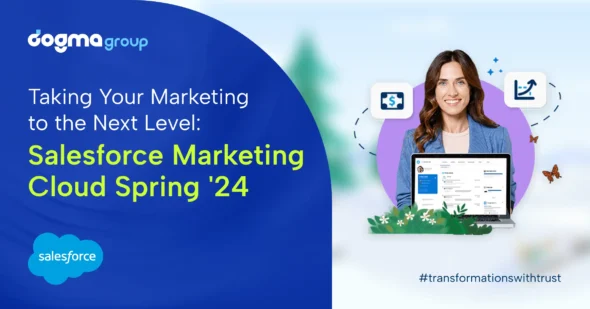Are you looking to deploy an eCommerce platform but stuck at the crossroads, deciding between Salesforce Commerce Cloud and Microsoft Dynamics 365 Commerce?
Selecting the most suitable platform can be a daunting task, as each retail and eCommerce company has distinct requirements and objectives, in addition to varying back-end systems and procedures, and each commerce solution boasts its own seat of capabilities and features.
However, the key questions you should ask as a retailer while considering an eCommerce platform are:
- Do you need a true omnichannel sales?
- Do you plan to integrate your ERP and analytics system?
- How do you plan to support your call centre and customer service teams?
- Do you also need to support in-person Point of Sale purchases?
- How are you going to handle order management after a purchase?
- What is the cost of licensing?
- What other advantages can you achieve with the platform?
Here we break down all these questions to help you decide between Salesforce Commerce Cloud and Dynamics 365 Commerce solutions.
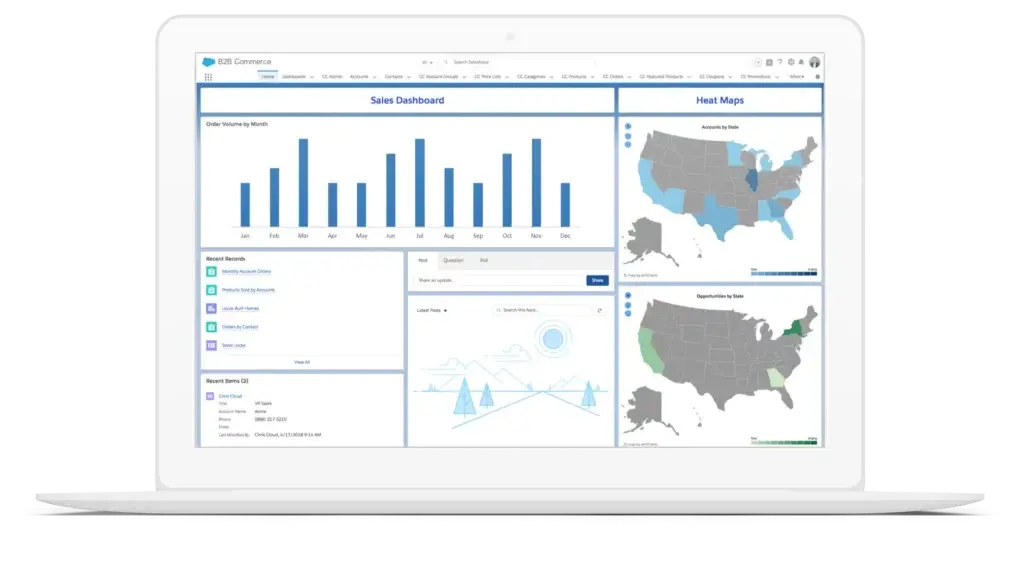
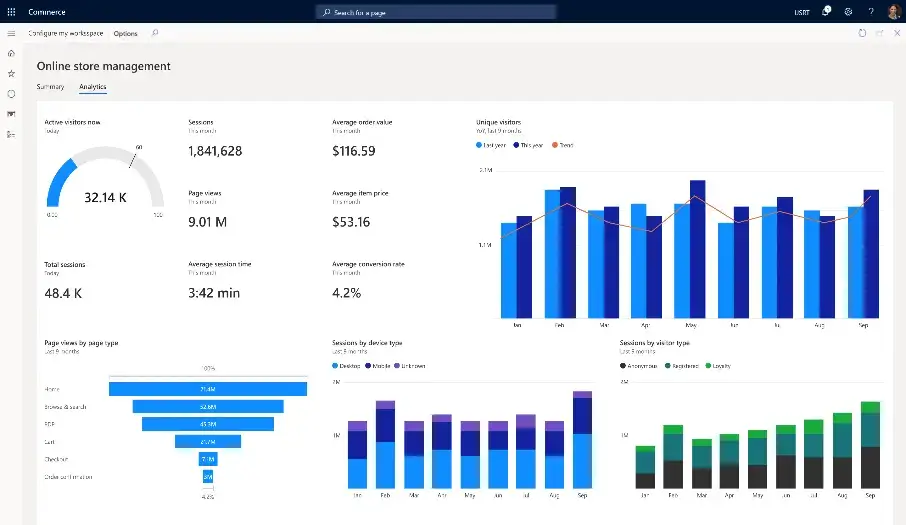
Displaying products and accepting orders is barely enough to keep your customers happy. You also need to consider what happens after the checkout as you need to optimise your order management and delivery process as well for maximum customer satisfaction.
To achieve this, you need to look beyond the surface and ensure that your platform supports end-to-end order management on all sales channels. Whether your customers prefer to shop online, in person, or on the phone, you need a solution that can handle all their omnichannel purchasing behaviour. In other words, you should not settle for a platform that only does half the job. Instead, choose the one that can help you take your retail organisation to the next level with omnichannel sales.
i. Platform
Both Salesforce Commerce Cloud and Dynamics 365 Commerce offer comprehensive ecommerce solutions for B2B, B2C, and D2C commerce. But Microsoft’s Commerce platform goes further by providing support for Point of Sales (POS), call centre, and order management (OM) with distributed OM and intelligent OM capabilities.
This means that Dynamics 365 Commerce is a true omnichannel solution that can handle all your customers’ purchasing behaviour, whether they prefer to shop online, in person, or on the phone. Plus, Dynamics 365 Commerce leverages other popular Microsoft services, like Security Copilot, Azure Services, OpenAI, and interconnectivity with other native products, like Microsoft 365, Business Central, Sales, and Power Platform.
On the other hand, Salesforce Commerce Cloud is not built on the Salesforce platform like its other products. Instead, it is built on the Demandware system that Salesforce acquired for rapid growth in the commerce platform segment. Salesforce Commerce Cloud offers three commerce platforms: B2C Commerce, for companies with complex requirements that need an elevated level of scalability; B2B Commerce, for B2B companies; and B2B2C or D2C Commerce, for B2B Commerce customers who also want to sell directly to consumers. Salesforce also offers separate products, at additional cost, for order management, customer portals and payments.
While both platforms provide comprehensive ecommerce solutions, Dynamics 365 Commerce has an advantage with its ability to support Point of Sales (POS), call centre, and intelligent order management, making it a true omnichannel solution that can handle all sales channels.

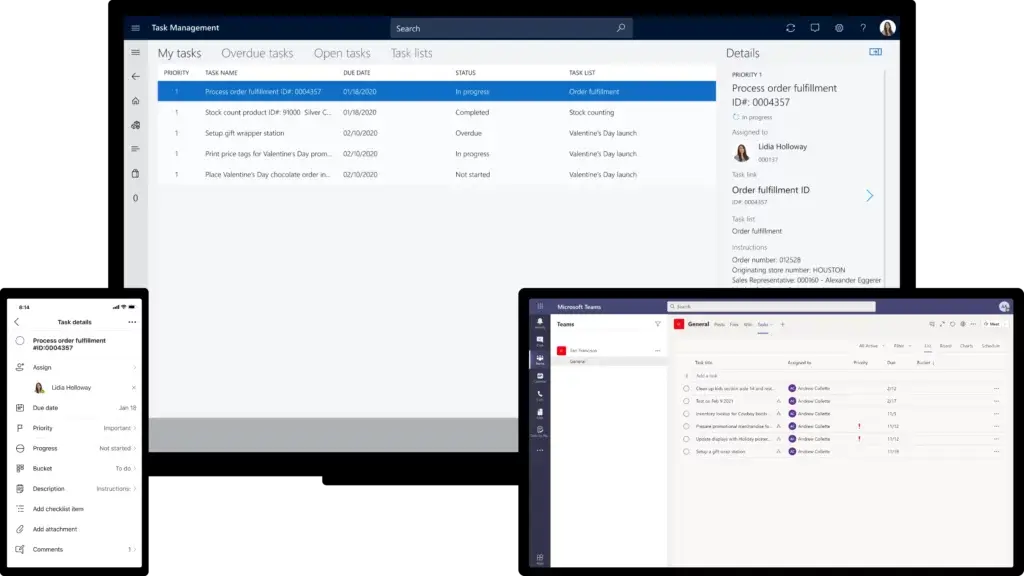
ii. Native Features
One of the key advantages of Dynamics 365 Commerce is that it offers built-in features for ratings and reviews, on-location pickups, loyalty accounts, and intelligent product reviews. It also includes a native Content Management System (CMS) with Digital Asset Management (DAM) features at no additional cost. These features allow retailers to build brand loyalty through personalised customer engagements and increase revenue with improved employee productivity.
Salesforce Commerce Cloud also offers a range of native features that can help retailers improve customer engagement, including personalisation, AI-powered product recommendations, and predictive search. However, some of these features may come at an additional cost, depending on the specific platform and capabilities selected.
| | Microsoft Dynamics 365 Commerce | Salesforce Commerce Cloud |
| eCommerce | Yes | Yes |
| Point of Sale | Yes | No |
| Call Centre | Yes | No |
| Order Management Distributed OM Intelligent OM | Yes Yes | Yes No |
| Online Payment Processing | Yes | AppExchange Integration Required |
| Integration Fraud Protection | Yes | External Integration Required |
| ERP Integration | Yes | No |
| CRM Sales, Service, and Marketing Integration | Yes | Yes |
| Analytics | Yes | Yes |
| Integrated Loyalty Program | Yes | Limited |
| Discounts and Promotions | Yes | Limited |
| Headless CMS | Yes | Yes |
Need a comprehensive comparison between Salesforce Commerce Cloud and Microsoft Dynamics 365 Commerce? We can help!
iii. Deployment Options
Dynamics 365 Commerce can be deployed on-premise or in the cloud, depending on your need. This flexibility allows retailers to choose the deployment option that best suits their specific business requirements. On the other hand, Salesforce Commerce Cloud is a cloud-based platform, which means that it may not be suitable for all retailers.
2. Artificial Intelligence
Another area in which Dynamics 365 Commerce and Salesforce Commerce Cloud differ is AI, where they have distinct offerings.
Salesforce’s AI offering, Einstein, is a significant highlight of the platform. It is an AI-powered solution that empowers marketers and retailers to make smarter decisions and improve personalisation across multiple sales channels. This AI technology offers features such as Einstein Product Recommendations, Einstein Predictive Sort, Einstein Commerce Insights, Einstein Search Dictionaries, and Einstein Search Recommendations. With Einstein, businesses can tailor the shopping experience to each buyer using highly personalised product suggestions based on customer history, social media activity, web behaviour, and more. This optimises product bundles, sets, and deals, enabling retailers to provide their customers with exactly what they need when they need it.
On the other hand, Dynamics 365 Commerce provides product enrichment assist capability, a Copilot feature for site builders that provides a completely reimagined way to instantaneously create persuasive product descriptions and marketing content for e-commerce websites. Copilot is an AI work companion, available to assist businesses with authoring compelling and engaging product storytelling content when they need it.
This further helps drive customer engagement and sales by generating content optimised for search engines to increase visibility and improving the tone and personalisation of the message for better customer loyalty and sales conversions.
Overall, Einstein for Salesforce Commerce Cloud offers a more comprehensive set of features that enable businesses to personalise their platform to each user, optimise product bundles, sets, and deals, and provide highly relevant product recommendations to their customers. As compared to that, Dynamics 365 Commerce Copilot offers businesses a reimagined way to create persuasive and compelling product enrichment and marketing content for their ecommerce websites that are optimised for search engines and tailored to the specific audience. Ultimately, the choice between these two platforms depends on the specific needs of each business.
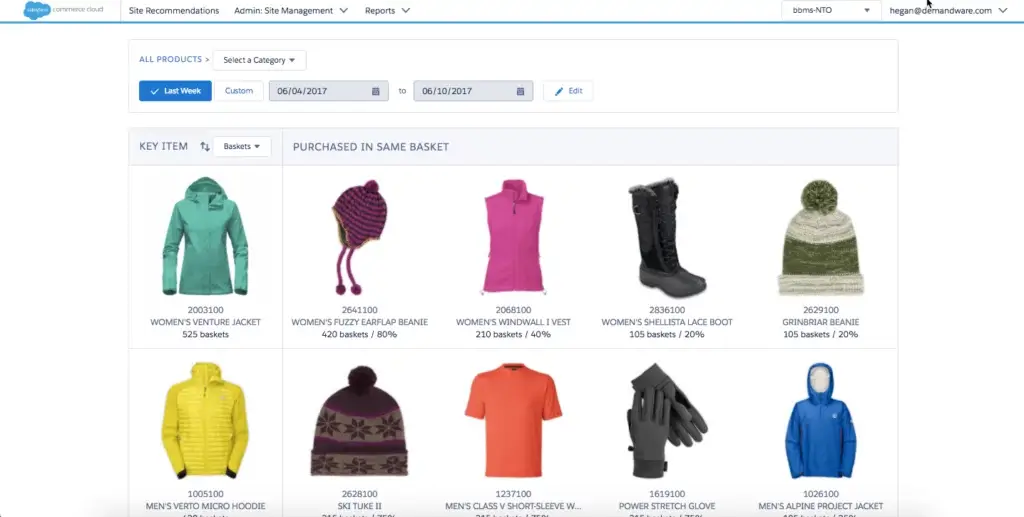
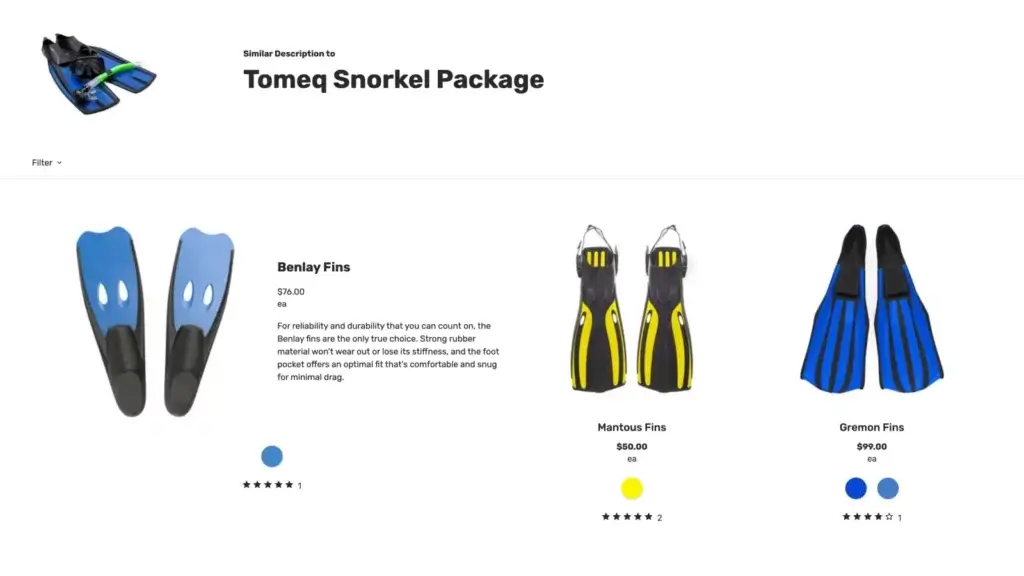
3. Payment and Fraud Protection
When it comes to payment and fraud protection, both Microsoft Dynamics 365 Commerce and Salesforce Commerce Cloud offer robust features. However, there are some key differences to consider.
Microsoft Dynamics 365 Commerce offers online payment processing out of the box, which can save retailers time and hassle. Additionally, it offers built-in integration with Fraud Protection, a powerful tool that can help retailers detect and prevent fraudulent transactions. Another useful feature is Split Payment Plugin Support, which allows retailers to easily split a single payment between multiple parties.
In contrast, Salesforce Commerce Cloud requires external integration for online payment processing, which can add complexity and cost to the implementation process. The platform does offer Split Payment support, but it lacks built-in fraud protection, requiring AppExchange integration for this feature.
In summary, Microsoft Dynamics 365 Commerce may be a better choice for retailers who want an all-in-one solution for payment and fraud protection, while Salesforce Commerce Cloud may require more integration work but also offers flexibility for retailers who want to choose their own payment and fraud protection providers.
4. Out-of-the-Box Integration Capabilities
As an e-commerce business owner, you need a commerce platform that can seamlessly integrate with your existing or planned software.
In that regard, Dynamics 365 Commerce readily integrates with its other solutions, like Sales, Service, Marketing, and Power Platform. It also connects with the Finance and Supply Chain Management modules. This means that businesses can easily connect their commerce platform with other key software solutions. With Dynamics 365 Commerce, businesses can enjoy a more seamless and integrated workflow, reducing the need for manual data entry and other time-consuming tasks.
Salesforce Commerce Cloud also integrates well with its Sales, Service, and Marketing Cloud solutions, including analytics. However, Salesforce lacks a dedicated ERP platform. This means that businesses using Salesforce Commerce Cloud may need to invest in additional software solutions to manage their financial and accounting processes.
That said, Salesforce has AppExchange to extend the capabilities of its Commerce Cloud solution. The marketplace features numerous ready-to-use applications and extensions tailored to the retail industry, making it easy for businesses to find a solution tailored to their specific needs. Likewise, Microsoft also offers AppSource, a marketplace of its own for Dynamics 365 and Microsoft 365 users. There are plenty of connectors, APIs, and services that can enhance the user experience and functionality of its Commerce platform.
The final note: When it comes to out-of-the-box integration capabilities, both Dynamics 365 Commerce and Salesforce Commerce Cloud offer robust features. However, Dynamics 365 Commerce has dedicated enterprise resource planning, supply chain management, and finance platforms, making it a better fit for businesses that prioritise a more comprehensive and integrated workflow. While Salesforce Commerce Cloud lacks a dedicated ERP platform, businesses can leverage the Salesforce AppExchange marketplace to extend its capabilities.
5. Loyalty and Promotional Features
A customer loyalty program is an effective way to retain customers and encourage repeat business. Dynamics 365 Commerce has an integrated loyalty program feature that allows businesses to reward customers for their repeat purchases and brand advocacy.
Salesforce Commerce Cloud, on the contrary, does not have an integrated loyalty program feature. It needs to be integrated with the Loyalty Management Program of Salesforce.
Similarly, when it comes to discounts and promotions, Dynamics 365 Commerce offers comprehensive capabilities that enable retailers to create and manage several types of promotions, including free shipping, buy-one-get-one-free promotions, percentage-based discounts, and fixed discounts. Salesforce Commerce Cloud also has similar discounts and promotions features, but it is not as comprehensive as Dynamics 365 Commerce. The latter allows businesses to set up customer-specific pricing and discounts, as well as create custom discount codes at checkout based on their loyalty data. It also offers a range of pre-built promotion templates to quickly launch discounts and promotions.
6. User Experience
Both platforms offer a user-friendly interface, but Salesforce Commerce Cloud is easier to use and requires less technical expertise. Its drag-and-drop interface enables users to build and manage their online stores with ease, while its intuitive design helps to navigate through the platform with minimal training. In contrast, Dynamics 365 Commerce requires a higher level of technical expertise and can be more challenging to set up and use for those who are not already familiar with Dynamics 365 user interface and workflow.
7. Pricing
Another significant difference between Dynamics 365 Commerce and Salesforce Commerce Cloud is their pricing. While Salesforce pricing model is based on percentage of gross merchandise value (GMV), Dynamics 365 offers a per user per month subscription model.
Salesforce B2B Commerce, B2C Commerce, and D2C Commerce Starter packs cost 1% GMV each and B2B Commerce, B2C Commerce, and D2C Commerce Growth packs cost 2% GMV each. As for Dynamics 365 Commerce, the price starts at £147.90 per user per month with eCommerce add-in available at £3,287.80 per month.
What this means is Salesforce can be an ideal solution for small and medium enterprises with limited users and merchandise. But as retail operations scale and more users need to access the system to sell more goods, Dynamics 365 can be more cost-effective in terms of ownership.
Verdict
Both Salesforce Commerce Cloud and Dynamics 365 Commerce are robust commerce platforms that offer a wide range of features and integrations. However, Dynamics 365 Commerce has an edge when it comes to integration with ERP and other solutions. Salesforce Commerce Cloud, on the other hand, is easier to use, more scalable, and more cost-effective. Ultimately, the decision between these two platforms will depend on your business’s specific needs and requirements.
Every organisation is different, and what works for one may not work for another. That said, there are a few things to keep in mind while deciding between Salesforce Commerce Cloud and Microsoft Dynamics 365 Commerce.
Firstly, if you are already using Microsoft 365 and Dynamics 365 applications, Dynamics 365 Commerce is a natural fit for you. You will be able to seamlessly integrate this solution with your existing systems and streamline your retail processes in no time. But, if affordability and ease of use are your top priorities, Salesforce Commerce Cloud is the way to go.
Of course, finding the perfect commerce platform can be overwhelming, which is why it is always a clever idea to partner with implementation experts like Dogma. As Microsoft Gold Partners and Salesforce Elite Partners, we have years of experience implementing both solutions for many delighted customers.
We take a product-agnostic approach, which means we will first understand your unique needs and processes before recommending a solution. And, by working closely with you to implement the best-fit solution for your retail business, we provide easy configurations and customisations, change management, and 24/7 support services to ensure your digital transformation is fluid and geared towards digital imperative.
Finally, finding the right commerce solution is all about understanding your unique needs and choosing a solution that fits those needs perfectly. With the right partner by your side, you can streamline your processes, improve your retail operations, and drive more sales.

